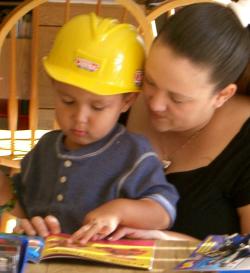Read to Your Children Every Day
 Children as young as 6 weeks old will begin to understand the basic foundation of language. They respond to sounds around them – have you ever made a loud noise while your baby was napping? If the noise was close enough for them to hear it, even though they were asleep, they most likely jumped. It was an involuntary motion, but it was a response to a sound!
Children as young as 6 weeks old will begin to understand the basic foundation of language. They respond to sounds around them – have you ever made a loud noise while your baby was napping? If the noise was close enough for them to hear it, even though they were asleep, they most likely jumped. It was an involuntary motion, but it was a response to a sound!
When babies hear the same voices everyday, they begin to associate these voices with wonderful things, such as an empty tummy being filled or a wet diaper being exchanged for a dry one. In order to thrive, babies must be held; when you pick up your little one and say her name, she quickly begins to associate your voice with that feeling she enjoys so much: being held. When these familiar voices begin to read stories, little ones take their first steps toward learning how language is put together.
Of course they don't know the meaning of any words they hear, but the sounds become familiar and begin to make impressions in their brains. These patterns are what they will use, as they get older, to create sentences of their own. The great thing about reading to babies, and even young toddlers, is they won't correct you! (The older a child gets, the more they know what words to expect. One day you'll hear your youngster say, “That's not how the story goes!”)
Here are some basic things to remember:
- Read out loud to your child every day – even if it's just for a few minutes. If you do this, it will become a habit and your child will come to expect it and look forward to it.
- As your child gets a little older, encourage her to participate. Have him turn the pages or tell you how the the story goes. For toddlers, it's not the exact words, rather it's the closeness and the sharing time.
- Ask your toddler questions about not only the story but the pictures as well. My daughters loved the Richard Scarry books. Each page was delightfully illustrated with loads of kid - recognizable things. We spent lots of time pouring over each page, identifying many, if not all, of the drawings!
- Relate the story to your family and things you and your child are either doing or planning to do.
- When you select books for babies, make sure the pages are thick and sturdy, so the little ones can hold the book and can open the pages without damaging them. And, as all parents know, babies love to put things in their mouths, so books for the littlest ones need to be sturdy enough to be chewed on!
- The younger the child, the simpler the book. Pages should have brightly colored pictures of recognizable forms. Look for books with one or two words per page. Toddlers aren't going to have the necessary attention span for lengthy and complicated stories but they can grasp a beginning, middle and end. Books for them can actually have “stories”, as opposed to simple picture books for babies.
- Virtually all children enjoy hearing words that rhyme. Reading nursery tales and poetry designed for children helps youngsters develop even more discreet language skills.
- Most important: have fun! The love of reading and the worlds it opens are among the best gifts a parent can give to a child.
